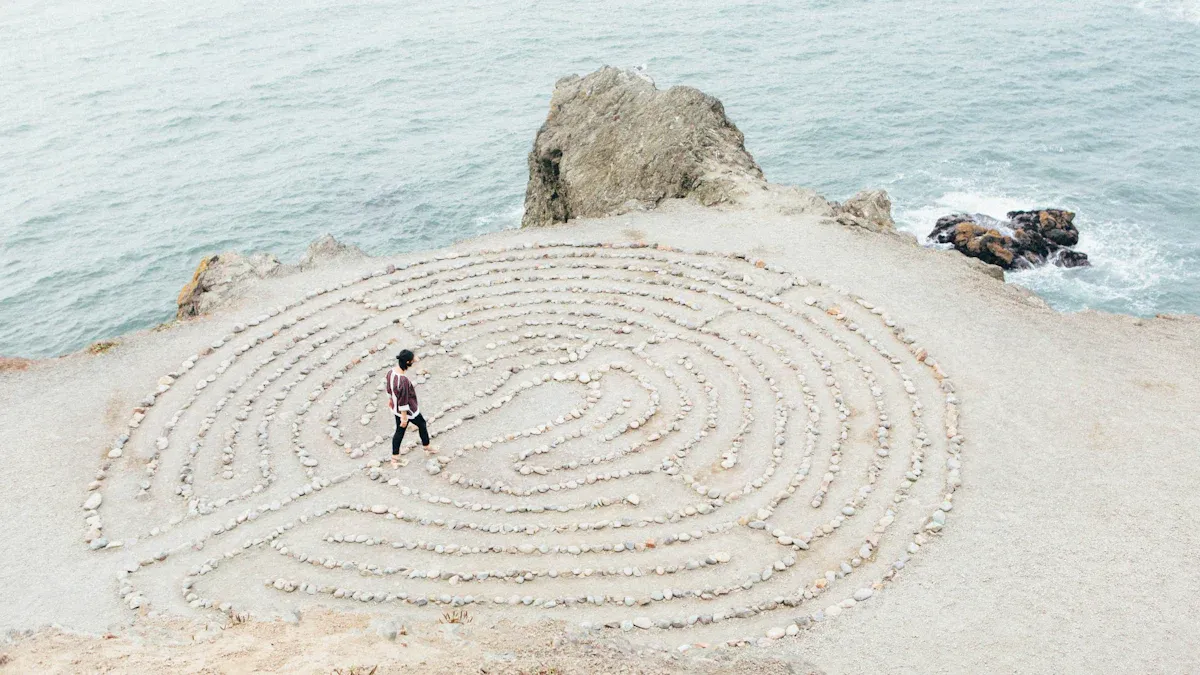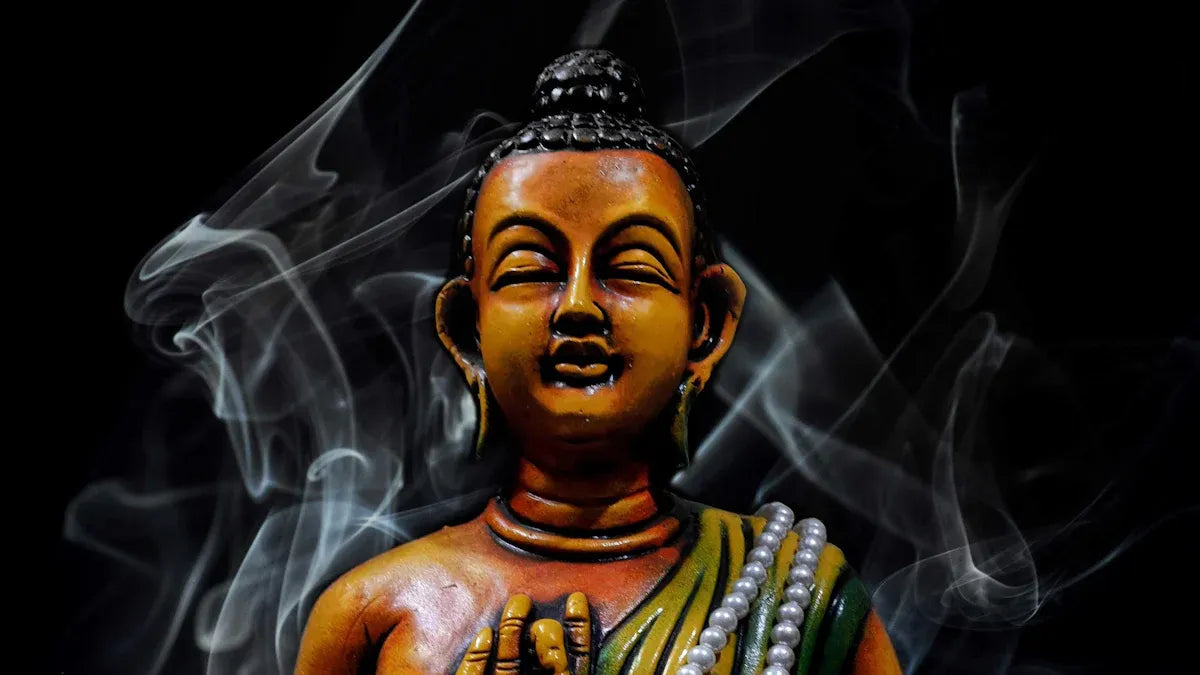Is karma real, and does it truly influence our lives? Think about a time when you made a kind gesture and later felt that good energy came back to you. In daily life, your choices often lead to clear consequences. For example, companies use data to predict outcomes and make better decisions:
|
Scenario |
Description |
Measurable Consequence |
|---|---|---|
|
Traffic Planning |
Estimate traffic likelihood based on conditions. |
Save time and reduce stress. |
|
Investing |
Assess probabilities to guide investment amounts. |
Impact financial outcomes. |
|
Health Insurance |
Estimate healthcare costs based on health factors. |
Set premiums reflecting risk. |
Karma works in a similar way. Your actions shape your path, and a mindful approach helps guide you toward positive outcomes. Reflect on how karma shapes your life, and consider how simple habits or even wearing meaningful jewelry can support your journey.
Key Takeaways
-
Karma means your actions and intentions create effects in your life, shaping your future and present.
-
Believing in karma helps you make kinder, more thoughtful choices that bring positive energy back to you.
-
You can break negative patterns by pausing, setting good intentions, and acting with awareness every day.
-
Building small, positive habits like gratitude and honesty improves your karma and leads to a happier life.
-
Using reminders like meaningful jewelry can help you stay mindful and focused on living with good karma.
Is Karma Real
Perspectives on Karma
You might wonder, is karma real, or is it just a comforting idea? People from different cultures see karma in unique ways. Some believe it is a universal law that connects every action to a future effect. Others see it as a spiritual principle of cause and effect that guides how you live your life.
A recent study in the European Journal of Social Psychology looked at how people in India and America view karma. The research found that Indians often see karmic justice as certain and unbreakable. Because of this, they feel less need for revenge. Americans, on the other hand, tend to see karma as less inevitable. When people in both cultures think about karma as something that always brings justice, they are less likely to act out of anger or seek payback. The study also showed that belief in reincarnation shapes how people view karmic influences and justice. This means your culture and beliefs can shape how you respond to the idea of what goes around comes around.
You can see karma as more than just a mystical idea. Many people use it as a guide for making choices, trusting that good actions will bring positive outcomes and negative actions will lead to some form of consequence. This belief can help you pause and think before you act, knowing that every choice has a ripple effect.
Tip: When you reflect on your actions and their possible outcomes, you start to notice patterns. This awareness can help you make better decisions and avoid repeating mistakes.
Some scientific approaches explore karma’s reality:
-
Randomized control trials show that belief in karma can shape moral decision-making.
-
Neuroimaging studies link certain brain regions to ethical reasoning connected to karmic influences.
-
Parapsychological research looks at phenomena like precognition, which some say relate to karma.
-
Psychological studies find that mindfulness and emotional intelligence often go hand-in-hand with ethical behavior and awareness of cause and effect.
-
Fractal mathematics sometimes reveals patterns that connect actions to outcomes, much like karma.
-
Community health programs show that shared beliefs in karma can shape group behavior and collective consequence.
-
Some scientists even use quantum physics ideas, like entanglement, to explain how everything might be connected—just as karma suggests.
Cause and Effect
You see cause and effect everywhere in daily life. If you study hard, you get better grades. If you skip sleep, you feel tired the next day. Karma works in a similar way. It is the idea that every action leads to an effect, even if you do not see it right away.
The spiritual principle of cause and effect says that your intentions and actions set things in motion. This principle is not just spiritual; it shows up in science, too. For example, research on consumer behavior found that people who believe in karma think more about the long-term effects of their choices. When reminded of their own mortality, these people are less likely to make selfish or wasteful decisions. They focus on how their actions today might shape their future. This shows that karma can guide you to think beyond the present moment and consider the bigger picture.
You might also notice that meditation and mindfulness practices help you become more aware of cause and effect in your life. Neuroscience research shows that these practices change how your brain works. They help you pay attention to your thoughts and actions, making it easier to see how one choice leads to another. This awareness can help you avoid negative patterns and build better habits.
-
Meditation, visualization, and symbol work give you first-hand experience of how your intentions shape your reality.
-
These practices create measurable changes in your brain, showing a link between your consciousness and the effects you experience.
-
While science has not proven karma in a strict sense, it does show that your mindset and actions have real, lasting effects.
When you start to see the world through the lens of cause and effect, you become more mindful of your choices. You realize that every action, big or small, can lead to a consequence. This understanding helps you take responsibility for your life and encourages you to make choices that bring positive karmic influences into your world.

Concept of Karma
Origins and Beliefs
When you look at the concept of karma, you find deep roots in ancient India. Over 3,000 years ago, people believed that actions during rituals could shape their future. Early texts like the Upanishads and the Mahabharata talked about how your intent and actions create real effects. These writings moved karma from just rituals to a bigger idea about how you live and make choices.
As time passed, Hinduism, Buddhism, and Jainism each gave their own spin to karma. Hinduism linked karma to the cycle of life, death, and rebirth. Your actions in this life could shape what happens after death. Buddhism focused on intentions and ethical living, teaching that you can break free from suffering by understanding karma. Jainism took it even further, saying karma is like a substance that sticks to your soul, and only strict non-violence and discipline can clean it away.
Note: The Mahabharata reminds you that every action, big or small, brings a result. You hold the power to shape your destiny through your choices.
Karma in Daily Life
You might wonder how karma fits into your daily routine. The concept of karma isn’t just about what happens after death. It’s about how your actions, words, and even thoughts shape your present and future. When you help someone, you often feel good inside. That positive energy can come back to you in unexpected ways.
Here’s a simple table to show how karma can show up in your life:
|
Action |
Possible Result |
|---|---|
|
Lying to a friend |
Loss of trust |
|
Helping a stranger |
Feeling of happiness, new friend |
|
Ignoring someone’s pain |
Missed chance for connection |
You see, the concept of karma teaches you to pay attention to your choices. Every day, you get chances to build good karma or learn from mistakes. When you act with kindness, you create a ripple effect that can touch many lives. Even small acts matter. Over time, these choices shape your journey through life, death, and even the idea of rebirth.

Types of Karma

Personal Karma
You create personal karma every day through your choices, thoughts, and actions. This type of karma follows you as an individual and shapes the circumstances you face in life. Think of it as your own energy bank. Every good deed adds to your balance, while negative actions can hold you back. The karma that we are creating now can affect not only this life but also what happens after death.
Scholarly research breaks down personal karma into three main parts:
-
Agent type: Who you are and your role in a situation.
-
Urgency level: How important or immediate your action feels.
-
Karma balance: The amount of positive or negative karma you have.
Your actions depend on your current karma balance. You make decisions based on your own state, not on what others do or what happened in the past. This means you have the power to change your path at any moment. No karma debt exists in this model, so you always start from your current balance. Every choice matters, and each one can move you closer to a better future or teach you a lesson for next time.
Collective Karma
Collective karma goes beyond the individual. It comes from the combined actions and intentions of groups, communities, or even entire nations. When many people act with kindness, you can see positive changes in society. On the other hand, widespread negativity can lead to conflict or hardship. Collective karma often shows up in big events, like social movements, economic trends, or even natural disasters.
This type of karma suggests that your actions, along with those of others, help shape the world around you. For example, if a community values compassion, peace often follows. If negativity spreads, trouble may arise. Collective karma can even influence what happens after death, as some traditions believe your group’s actions affect your next life. By making mindful choices, you help create a better world for everyone.
Karma and Choices
Decision-Making
Every day, you face choices that shape your path. Some decisions seem small, like what to eat for breakfast. Others feel huge, like choosing a career or ending a relationship. When you understand karma, you start to see how each action can ripple through your life. You realize that your intentions matter just as much as your actions.
If you want to make better decisions, start by pausing before you act. Ask yourself, “Will this choice bring positive energy to me and others?” This simple question can help you avoid actions that might lead to regret. Many people find that reflecting on their motives helps them choose kindness, honesty, and patience.
Tip: When you focus on doing your duty without worrying about the reward, you free yourself from stress. This idea comes from Karma Yoga, which teaches you to act with purpose and let go of the outcome. Studies show that this approach can boost your well-being and help you feel more satisfied with your life.
You can also use tools to remind yourself to stay mindful. For example, wearing a KarmaBless bracelet can serve as a gentle nudge to keep your intentions pure and your energy balanced. Each time you see it, you remember to act with compassion and clarity.
Breaking Cycles
Sometimes, you notice patterns in your life that keep repeating. Maybe you always react with anger in certain situations, or you find yourself stuck in unhealthy relationships. These cycles can feel hard to break. Karma teaches you that you have the power to transform your karma by making conscious choices.
Start by observing your habits. Notice when you fall into old patterns. Instead of blaming yourself, see each moment as a chance to choose differently. Research on Karma Yoga highlights the value of acting without attachment to results. When you let go of the need for a specific outcome, you open yourself to new possibilities.
Here are a few steps to help you break negative cycles:
-
Pause and Reflect: Before reacting, take a deep breath. Give yourself a moment to think.
-
Set a Positive Intention: Decide how you want to respond, not just how you feel in the moment.
-
Act with Awareness: Make your choice with full attention, knowing it shapes your future.
-
Celebrate Small Wins: Each time you break a cycle, acknowledge your progress.
Note: Studies show that selfless actions and equanimity—staying calm no matter what—can reduce stress and help you build stronger connections with others. These qualities are at the heart of karma and can help you create lasting change.
If you need extra support, consider using symbolic objects or rituals. Many people find that holding a crystal or wearing a meaningful charm, like those from KarmaBless, helps them stay grounded and focused on their goals.
Building Habits
Building good habits is one of the best ways to align your life with positive karma. Habits shape your days, and your days shape your destiny. When you choose actions that reflect kindness, honesty, and generosity, you set yourself up for a happier, more peaceful life.
Research on Karma Yoga and related philosophies offers a practical framework for daily living. The key is to focus on your duty, act with integrity, and let go of the need for immediate rewards. This approach helps you stay motivated and resilient, even when things get tough.
Try these steps to build habits that support positive karma:
-
Start Small: Pick one habit to focus on, like saying thank you or helping someone each day.
-
Use Reminders: Place a note on your mirror or wear a KarmaBless bracelet to keep your intention front and center.
-
Track Your Progress: Keep a journal or checklist to see how your actions add up over time.
-
Practice Equanimity: Stay calm and balanced, even when things don’t go as planned.
|
Habit |
Positive Impact on Karma |
|---|---|
|
Daily gratitude |
Attracts positive energy |
|
Acts of service |
Builds social connection |
|
Mindful breathing |
Reduces stress and anxiety |
|
Honest communication |
Strengthens trust |
Remember: Every small action counts. Over time, these habits can transform your karma and help you create the life you want.
When you align your choices with positive intentions, you invite more harmony and balance into your world. Lifestyle tools like KarmaBless jewelry can support your journey by serving as daily reminders of your commitment to mindful living and positive energy.
Karma in Life Events

Relationships
Your relationships shape your journey through life. Every action you take with friends, family, or partners creates a ripple. When you act with kindness, you often find that trust and support come back to you. People who believe in karma tend to expect more reciprocity and trust in their relationships. Take a look at this table that shows how belief in karma connects to what people expect and how they act:
|
Outcome Measure |
Association with Belief in Karma |
Statistical Evidence |
|---|---|---|
|
Expectation of Reciprocity |
Higher expectations for karma believers |
Mean difference = 2.03 (SD=2.95), t(332)=12.55, p<.001 |
|
Trusting Decision (binary) |
More trusting of karma believers |
Mean difference = 0.24 (SD=0.38), t(332)=11.57, p<.001 |
|
Actual Reciprocal Behavior |
No significant difference |
Karma believers: 56.68% reciprocated; Non-believers: 61.65%; χ2(1)=0.65, p=0.421 |
|
Discrepancy between expectation and behavior |
Significant difference in expected vs. actual reciprocity |
Poisson regression: three-way interaction b=-1.43, SE=0.28, p<.001 |
You might notice that your own karmic influences show up in how you treat others and how you expect to be treated. For example, if you help a friend move, you may expect help in return. Sometimes, though, your expectations and reality do not match. This is a normal part of life and can teach you about patience and letting go.
Stories from real life show how karmic experiences shape relationships. Imagine two sisters, Jenny and Lisa. Jenny always helped Lisa, feeling a sense of duty. Over time, Lisa realized the debt was paid and wanted a more equal bond. This shift brought balance and growth to their relationship. You can use this lesson in your own life by reflecting on your actions and seeking harmony.
Wearing a symbolic bracelet or using a ritual can remind you to act with compassion and balance. These small acts help you stay mindful of your karmic influences every day.
Challenges and Growth
Life brings challenges, but each one offers a chance for growth. When you face tough times, you might wonder if karmic influences play a role. Many people find that overcoming obstacles leads to greater wisdom and strength. Research shows that practices like mindfulness and intention-driven healing can help you build resilience and emotional balance.
|
Aspect |
Quantitative Evidence |
Qualitative Evidence |
|---|---|---|
|
Transformative Outcomes |
70% report long-term emotional benefits from mystical states |
Increased resilience, reduced fear of death, and clarity in life purpose reported |
|
Intention-Driven Healing |
Large effect size (d = 0.79) confirming physiological benefits |
Testimonials highlight emotional and spiritual benefits of practices like Reiki |
You might notice that after a difficult event, you feel more connected to others or have a clearer sense of purpose. These moments show how karmic experiences can lead to personal growth. People from many cultures use simple rituals, meditation, or even wearing a KarmaBless bracelet to support their journey. These tools help you focus your intentions and invite positive energy into your life.
Tip: When you face a challenge, pause and ask yourself what lesson you can learn. This mindset turns obstacles into stepping stones for a better life.
You shape your life with every choice you make. Research shows that people often see their own karma as positive, while judging others more harshly.
-
Studies across the U.S., India, and Singapore reveal that beliefs in karma help you keep self-esteem high and make sense of life’s ups and downs.
-
Over 2,000 participants showed a strong link between karma and how they view themselves and others.
Karma influences your habits, relationships, and even how you treat the planet. Studies from China and other countries show that karma-driven thinking leads to more honest, caring, and sustainable actions. When you reflect, act with intention, and use mindful tools like KarmaBless jewelry, you invite more balance and positive energy into your daily life.
FAQ
What is the easiest way to build good karma every day?
Start with small acts of kindness. Smile at someone, help a friend, or say thank you. These simple actions create positive energy and help you build good karma over time.
Can wearing KarmaBless jewelry really affect my karma?
KarmaBless jewelry acts as a daily reminder to stay mindful and positive. When you wear it, you focus on your intentions and actions. Many people find that this helps them make better choices and attract good energy.
How do I know if I am stuck in a negative karma cycle?
You might notice the same problems keep coming up. Maybe you feel stuck or frustrated. If this happens, pause and reflect. Try changing your response or habits to break the cycle.
Do my thoughts count as karma, or just my actions?
Both matter! Your thoughts shape your intentions, and your intentions guide your actions. Positive thinking can lead to positive actions, which helps you build good karma.












